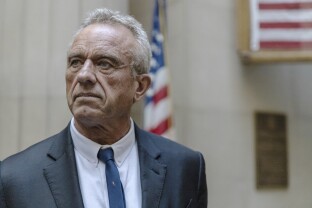The Department of Health and Human Services fired all 17 members of a committee that makes recommendations on the safety and efficacy of vaccines, Health Secretary Robert F. Kennedy Jr. announced Monday.
In an op-ed published in The Wall Street Journal, Kennedy, who has a long history of vaccine skepticism, wrote that remaking the Centers for Disease Control and Prevention’s Advisory Committee on Immunization Practices was necessary to restore public trust in the federal health system, claiming that the committee has been “plagued with persistent conflicts of interest and has become little more than a rubber stamp for any vaccine.”
“The public must know that unbiased science guides the recommendations from our health agencies,” Kennedy added. “This will ensure the American people receive the safest vaccines possible.”
The ACIP sets the immunization schedules for both adults and children in the U.S., and it has historically been composed of scientists and medical experts with established research backgrounds, as well as one consumer advocate member.
As national experts in immunology, public health, infectious diseases and other fields, members of the ACIP have worked with pharmaceutical companies, which creates conflicts of interest that they are required to disclose and avoid by recusing themselves from discussion about vaccines they have done research on.
But Kennedy has pointed to the relationships between ACIP members and the pharmaceutical industry as evidence of “corporate capture,” and created a database of conflict of interest disclosures of ACIP members soon after his confirmation as health secretary. These disclosures were already publicly available.
New members of the ACIP are currently “under consideration,” HHS said in a statement. The next committee meeting is scheduled for later this month at CDC headquarters in Atlanta.
Changes to the ACIP could affect the access, affordability and acceptance of vaccines nationwide, public health experts told NOTUS last year. For example, if the ACIP removes vaccines from the immunization schedules, it could determine whether they are covered by insurance. It could also decide which vaccines states require children to receive before attending public school. And medical practitioners look to the federal recommendations when giving advice to patients.
The ACIP has played a divisive role in Kennedy’s rise to health secretary. As part of his campaign to convince skeptical senators to vote for his confirmation, Kennedy reportedly promised Sen. Bill Cassidy of Louisiana, the chair of the Senate Committee on Health, Education, Labor and Pensions, that he would not make any changes to the ACIP’s membership.
On Monday, Cassidy told reporters that Kennedy promised during his confirmation hearings that he wouldn’t change the vaccine recommendation process — not that he’d maintain the committee itself.
He added that he’d spoken with Kennedy twice Monday afternoon.
In a post on X following the firings, Cassidy wrote that “now the fear is that the ACIP will be filled up with people who know nothing about vaccines except suspicion.”
He added that he’ll “continue to talk with him to ensure this is not the case.”
The dissolution of the current ACIP comes amid other blows to the availability of vaccines. Kennedy announced last month that the CDC would no longer recommend COVID-19 booster shots to healthy pregnant women or children. And HHS has recently cancelled several contracts with companies developing new vaccines for avian influenza and COVID-19.
—
Margaret Manto is a NOTUS reporter and an Allbritton Journalism Institute fellow. Helen Huiskes contributed reporting.
Editor’s Note: This story has been updated with additional reporting.
Sign in
Log into your free account with your email. Don’t have one?
Check your email for a one-time code.
We sent a 4-digit code to . Enter the pin to confirm your account.
New code will be available in 1:00
Let’s try this again.
We encountered an error with the passcode sent to . Please reenter your email.


